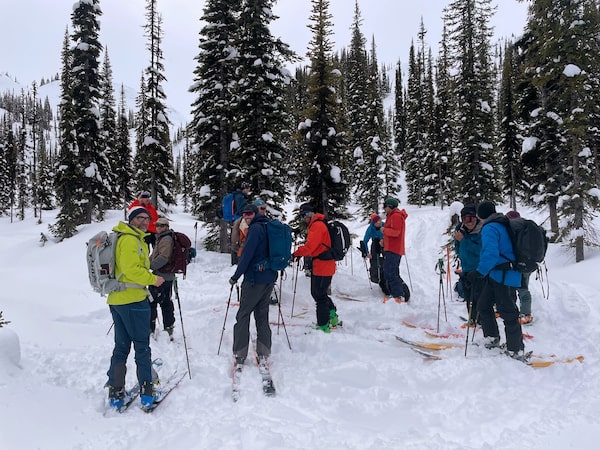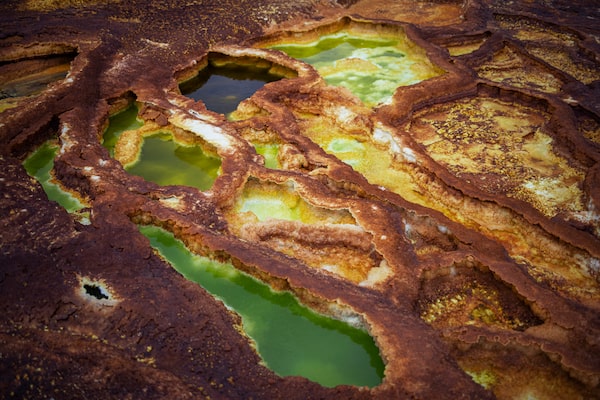If you’re reading this on the web or someone forwarded this e-mail newsletter to you, you can sign up for Globe Climate and all Globe newsletters here.
Good afternoon, and welcome to Globe Climate, a newsletter about climate change, environment and resources in Canada.
In exactly one week, many Canadians will be able to see the total solar eclipse on April 8. And in all of Canada, one of the best views of the phenomenon will be at Niagara Falls.
That’s why officials in the Niagara Region are hoping for the best but preparing for the worst after taking the unprecedented step of proactively declaring a state of emergency. The mayor of Niagara Falls said the most visitors the city has seen in a single day is around 150,000. Officials think the eclipse could bring up to a million.
As you get your eclipse viewing plans in place, make sure you have protective eyewear too.
Now, let’s catch you up on other news.
Tourists on the American side of Niagara Falls take photos in Niagara Falls, N.Y. on Friday, March 29, 2024.Carlos Osorio/The Canadian Press
Noteworthy reporting this week:
- Carbon pricing 101: What today’s increase could mean for you, plus more carbon tax stories below
- Outlaw ocean investigation: When inspectors call, India’s shrimp plants find ways to keep abuses out of sight
- Compensation: Suncor Energy pays new CEO Richard Kruger $36.8-million in first year
- Snow: Thin snowpack in mountains of Alberta, B.C. forcing farmers to manage operations carefully this year
- Infrastructure: Vancouver wastewater treatment plant four times over budget and 10 years late
- Investing: Thames Water shareholders refuse to invest more money, throwing the utility’s future in doubt
- Transportation: A different kind of steam engine? How CPKC aims to decarbonize its fleet with hydrogen locomotives
- From The Narwhal: Remembering Bob the elk? What the life and death of a B.C. town’s beloved neighbour can teach us
A deeper dive
Losing winter
The Following is an excerpt from Ian Brown’s story What we lose when we lose winter.
Being denied the enormous privilege of back-country skiing in the mountains is an irrelevance next to the climate-induced tragedies that less fortunate people are already suffering. But winter – cold, dark, unforgiving winter – created half our collective human physical consciousness of the world. The day will come (not soon, I hope) when I can’t physically manage skiing any more, and that will be the sharp but thrilling price of having lived, of getting older. But to lose the season altogether feels cataclysmic.
I later asked Prof. Burakowski, the climate scientist at the University of Vermont, why it felt so sad. “There is a word for it,” she said. “Solastalgia.”
Solastalgia is the distress one feels as a result of unforeseen and uncontrollable environmental changes in one’s home territory. There’s a mountain in your backyard, and then it is mined away to nothing. You’re used to the engulfing silence of winter snowstorms, and suddenly there are no more storms.
“For me,” Prof. Burakowski told me – she’s a long-time snowboarder, which should not be held against her – “when I look out on a 70-degree day in February, which we’ve had in the last couple of years, things don’t look snowy at all. It just looks kind of bland. I’m grieving the loss of winter-like conditions that I grew up with, that remind me of what home used to be like.”
To stave off boredom one grey afternoon, after everyone had skinned their laps, we built an igloo down the slope from the cabin. It was a proper, well-planned igloo with a proper sunken entrance, all built from proper quarried snow blocks. It took four hours and accommodated 14 people. That’s a big igloo. We made it together, and then piled in and sat on its built-in snow benches, chatting and drinking beer.
On our seventh and last night, the night before the helicopter came to take us back to snowless civilization, we sat and talked and joked in our igloo, with a boom-box and a battery-operated disco light someone found in the cabin. I have to say it was one of my favourites of all the nights I have spent outdoors in the mountains. No one was ever unhappy in the igloo. It was proof of our collective ability to stay engaged in any circumstance, and an artifact of our friendship imposed upon the landscape.
Maybe there is an ironic justice in that: After all, it was mankind’s love of the inside, of comfort and safety and warmth and convenience gained through the extraction of coal and oil and gas, that ultimately warped the climate and made winter less dependable, less formative and less Canadian.
In the igloo that last night we talked, of course, about next year, about the next trip, about new places we might go to ski. Someone suggested we set up a winter camp of our own, with platform tents and a stove, and ski up and out and down from there. I worry, as always, that I’ll be too old to manage it, but I hope it happens: I want at least one more real winter, to tell me if it’s time to stop.
The discussion did not include any mention of the disappointment our current trip had become, nor did we question whether there would be any snow to ski on. That’s not the way human beings approach the future.

Ian Brown's ski group assembles.Ian Brown/The Globe and Mail
Carbon tax news
Today marks the first day of Ottawa’s carbon price increase, but it seems there is still lots up for debate. While economists defend the Liberals’ carbon price, political rhetoric is heated as ever.
Last week, the Conservative chair of a House of Commons committee rolled out the welcome mat to premiers opposed to the carbon price increase in an unusual move that caught some MPs by surprise, prompting complaints about breaches of procedure. Newfoundland and Labrador’s Premier penned a letter to Prime Minister Justin Trudeau over the weekend asking for an “emergency meeting of leaders.” In Ontario, the government is extending a temporary gas tax cut until the end of the year, in Premier Doug Ford’s last-ditch plea to the feds to abandon the carbon price hike.
It still remains Conservative Leader Pierre Poilievre’s signature cause: The party’s long-standing vow to “axe” the Liberal government’s consumer carbon price.
Meanwhile, the PM has accused conservative politicians across Canada, including premiers, of lying to Canadians about the carbon price. Trudeau also pushed back against premiers who are asking him to cancel the increase to the federal carbon price, saying they have not proposed better ideas to fight climate change.
Opinions:
- Marcus Gee: What Trudeau should say about the carbon tax
- Campbell Clark: The premiers’ accidental clarity in carbon taxes
- Richard G. Lipsey: Carbon pricing is still the best way we have to support low-carbon economic growth
- Editorial: The carbon tax is a tool, not a goal
- Young money: There are good ways to make life more affordable for Canadians. Cutting the carbon tax isn’t one of them
What else you missed
- Low tide pauses efforts to save B.C. orca while rescuers plan next steps
- Endangered North Atlantic right whales lose three of 19 calves this season
- Canada’s coal exports up again in 2023 as government’s promised ban elusive
- Bittersweet Easter for consumers and African cocoa farmers but chocolate brands see profits
- Big Oil’s current low-carbon transition plans are not good enough, investor group says
- Climate change expected to drive shifts in urban birds, animals, bugs
- Lawsuit accuses B.C. gas utility of deceiving consumers over environmental impact
- Study finds climate change has made heat waves last longer, spike hotter, hurt more people
- Proposed emissions cap could hurt Trans Mountain pipeline’s sale price, Calgary Chamber of Commerce says
- Major European climate protection plan shelved following farmer protests
- Enbridge forms U.S. gas venture to feed LNG demand
Do you know an engaged individual? Someone who represents the real engines pursuing change in the country? Email us at GlobeClimate@globeandmail.com to tell us about them.
Photo of the week

A general view of the hydrothermal system of Dallol, in the Danakil Depression of the Afar region, on March 24, 2024. In the heart of the Horn of Africa, the Danakil Depression is one of the hottest, most inhospitable place on earth, with temperatures topping 50 degrees Celsius. With much of its territory lying an average of 100m below sea level, this scarcity populate area of the Afar region hosts one of only a handful of volcanoes to have an active lava lake, Erta Ale, and is littered with acid ponds, geysers and a deep crater with unearthly colours called Dallol.MICHELE SPATARI/Getty Images
Guides and Explainers
- Want to learn to invest sustainably? We have a class for that: Green Investing 101 newsletter course for the climate-conscious investor. Not sure you need help? Take our quiz to challenge your knowledge.
- We’ve rounded up our reporters’ content to help you learn about what a carbon tax is, what happened at COP28 and just generally how Canada will change because of climate change.
- We have ways to make your travelling more sustainable and if you like to read, here are books to help the environmentalist in you grow, as well as a downloadable e-book of Micro Skills - Little Steps to Big Change.
Catch up on Globe Climate
- How to get ready for the total solar eclipse on April 8
- Alberta’s drought is testing the limits of its water-licensing regime
- Can we modify the weather to help fight drought?
- Good governance is greener on the road to net zero
We want to hear from you. E-mail us: GlobeClimate@globeandmail.com. Do you know someone who needs this newsletter? Send them to our Newsletters page.
 Sierra Bein
Sierra Bein